
EUROPEAN JOURNAL OF PLANT PATHOLOGY
Scope & Guideline
Connecting science and sustainability in agriculture.
Introduction
Aims and Scopes
- Investigation of Plant Pathogens:
Research focused on the identification, characterization, and understanding of various plant pathogens, including fungi, bacteria, viruses, and nematodes, and their impact on plant health. - Disease Management Strategies:
Development and evaluation of integrated disease management practices, including biological control, chemical treatments, and cultural practices aimed at mitigating plant diseases. - Plant-Pathogen Interactions:
Exploration of the mechanisms of interaction between plants and pathogens, including host resistance, pathogen virulence factors, and the molecular basis of disease. - Epidemiology and Risk Assessment:
Studies on the spread of plant diseases, factors influencing disease outbreaks, and risk assessment models to predict disease impact under varying environmental conditions. - Use of Innovative Technologies:
Application of novel techniques such as molecular biology, bioinformatics, and nanotechnology in the study and management of plant diseases.
Trending and Emerging
- Biological Control and Biopesticides:
There is a notable increase in research focused on biocontrol agents and biopesticides, emphasizing the potential of utilizing natural organisms to manage plant diseases sustainably. - Molecular Characterization and Genomics:
Emerging trends include the molecular characterization of pathogens and host plants, leveraging genomic tools to understand resistance mechanisms and pathogen evolution. - Impact of Climate Change on Plant Pathology:
Research addressing the effects of climate change on plant disease dynamics is on the rise, with studies exploring how changing environmental conditions influence pathogen behavior and plant responses. - Use of Nanotechnology in Disease Management:
Innovative applications of nanotechnology for controlling plant diseases are gaining attention, highlighting the potential of nanoparticles in enhancing plant resistance and delivering bioactive compounds. - Interdisciplinary Approaches in Plant Health:
The integration of various scientific disciplines, including ecology, microbiology, and genetics, is increasingly evident in research articles, reflecting a holistic approach to understanding and managing plant diseases.
Declining or Waning
- Traditional Chemical Control Methods:
Research focused solely on conventional chemical treatments for disease management is becoming less prominent, as there is a growing emphasis on integrated and sustainable approaches that include biological control and preventive measures. - Generalized Pathogen Surveys:
While pathogen surveys remain important, there is a noticeable decline in studies that do not provide in-depth analysis or specific insights into the mechanisms of pathogenesis or host response, as researchers are increasingly focusing on detailed molecular interactions. - Non-Eco-Friendly Practices:
Research advocating for practices that lack sustainability or environmental considerations is waning, as the scientific community increasingly prioritizes eco-friendly and sustainable solutions in plant disease management.
Similar Journals

ARCHIVES OF PHYTOPATHOLOGY AND PLANT PROTECTION
Exploring the Frontiers of Agronomy and Crop ScienceArchives of Phytopathology and Plant Protection, published by Taylor & Francis Ltd, stands as a pivotal platform in the field of agronomy and crop science since its inception in 1974. With an ISSN of 0323-5408 and E-ISSN of 1477-2906, this journal is dedicated to publishing high-quality, peer-reviewed research that addresses contemporary challenges in plant pathology and protection. As a Q3 ranked journal in its category with Scopus Rank #210/406, it serves a vital role in disseminating practical solutions and innovative discoveries to enhance agricultural productivity and sustainability. The journal fosters a rich exchange of ideas among researchers, professionals, and students, empowering them to contribute to the advancement of the agronomy and biological sciences. Despite being traditionally subscription-based, the journal's commitment to comprehensive and rigorous research makes it an essential resource for anyone invested in the future of plant health and agricultural innovation.
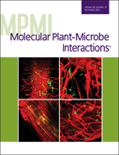
MOLECULAR PLANT-MICROBE INTERACTIONS
Bridging Science and Sustainability in AgricultureMOLECULAR PLANT-MICROBE INTERACTIONS is a premier journal dedicated to the exploration of the complex interactions between plants and microbes, providing a vital platform for researchers in agronomy, crop science, and plant physiology. Published by the American Phytopathological Society, this journal has been serving the academic community since 1988 and continues to be at the forefront of advances in molecular biology and plant-microbe symbiosis, with a notable impact factor reflecting its esteemed position in the field. As a Q1 journal in both Agronomy and Crop Science and Medicine (miscellaneous), and holding a significant ranking in the Scopus categories, it is recognized for publishing high-quality, peer-reviewed research that is essential for understanding and improving agricultural practices. Although it is not an open-access journal, it provides critical insights that facilitate collaborative efforts among researchers, professionals, and students alike. The journal’s objectives focus on enhancing our understanding of plant health, disease resistance, and ecological sustainability, making it a crucial resource for anyone interested in the intricate research landscape of plant-microbe dynamics.

PHYTOPATHOLOGIA MEDITERRANEA
Connecting scholars to the latest in crop science.PHYTOPATHOLOGIA MEDITERRANEA is a premier open access journal published by the Mediterranean Phytopathological Union, dedicated to advancing knowledge in the fields of Agronomy, Crop Science, Horticulture, and Plant Science. With its Q1 status in Agronomy and Crop Science and Horticulture and a strong ranking in Plant Science, this journal is recognized for its significant contribution to research, featuring high-quality studies and reviews that address contemporary challenges in plant health and disease management. As an essential resource for researchers, professionals, and students, PHYTOPATHOLOGIA MEDITERRANEA facilitates the dissemination of cutting-edge research and serves as a critical hub for academic discourse in the Mediterranean region and beyond. Since embracing open access in 2014, the journal has further enhanced its visibility and accessibility, providing a valuable platform for innovative ideas and collaborative research in the vital domain of plant pathology. The journal is indexed in Scopus with impressive rankings, including the 20th percentile in Horticulture, which underscores its esteemed position within the academic community, making it an indispensable source for anyone looking to stay abreast of developments in the field.
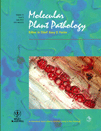
MOLECULAR PLANT PATHOLOGY
Transforming agricultural practices through molecular insights.MOLECULAR PLANT PATHOLOGY, published by Wiley, is a leading academic journal in the fields of Agronomy, Molecular Biology, Plant Science, and Soil Science, with a strong reputation underscored by its impressive Q1 rankings across multiple categories and a Scopus rank placing it in the top echelons of its fields. Since embracing Open Access in 2019, this journal has significantly broadened its reach, enhancing visibility and accessibility for researchers, professionals, and students alike. With a commitment to publishing high-quality, innovative research, MOLECULAR PLANT PATHOLOGY serves as a critical platform for advancing our understanding of plant diseases and pathogenesis, contributing to the development of sustainable agricultural practices. As a vital resource for scholarly communication, it fosters collaboration among scientists and supports the sharing of vital knowledge that addresses issues of global food security and environmental health.

Phytopathology Research
Pioneering discoveries in plant pathology and molecular biology.Phytopathology Research, published by SPRINGERNATURE, serves as a vital resource in the rapidly evolving fields of biochemistry, genetics, molecular biology, and plant sciences. Since adopting an open access model in 2019, this journal has fostered an inclusive approach to disseminating cutting-edge research and breakthroughs in plant pathology and related disciplines. With an impressive impact factor in the second quartile for Biochemistry, Genetics and Molecular Biology (miscellaneous) and Plant Science, and a robust standing in the Scopus rankings, it attracts high-quality contributions from researchers around the globe. The journal not only supports the academic community's quest for advanced knowledge but also plays a crucial role in addressing global agricultural challenges through innovative research. Positioned in the United Kingdom and operating with a keen focus on enhancing plant health and resistance, Phytopathology Research continues to be an essential platform for both established and emerging scientists in this vital area of study.
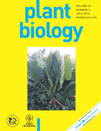
PLANT BIOLOGY
Fostering Collaboration in Plant SciencePLANT BIOLOGY is a prestigious academic journal published by Wiley, dedicated to advancing knowledge in the fields of plant science, ecology, and evolutionary biology. With an impressive impact factor and ranking in the Q1 category for Ecology, Evolution, Behavior and Systematics, and Plant Science as of 2023, it stands at the forefront of research dissemination. The journal encompasses a broad scope of plant biology topics, providing a critical platform for researchers to share innovative findings and foster interdisciplinary collaboration. Available in both print (ISSN: 1435-8603) and online formats (E-ISSN: 1438-8677), it ensures accessibility through open access options. As a crucial resource for professionals, researchers, and students alike, PLANT BIOLOGY cultivates a deeper understanding of plant systems and their ecological significance, making it an essential addition to the library of anyone dedicated to the study of biology and the environment.

BANGLADESH JOURNAL OF BOTANY
Empowering Researchers in Plant BiologyBANGLADESH JOURNAL OF BOTANY is a prominent publication in the field of plant sciences, dedicated to advancing research and knowledge within the botanical community. Published by the BANGLADESH BOTANICAL SOC, this journal serves as a vital platform for researchers and scholars seeking to disseminate their findings related to plant biology, ecology, and conservation practices, particularly within the unique context of Bangladesh's diverse flora. With an ISSN of 0253-5416 and an E-ISSN of 2079-9926, the journal encompasses a wide scope of topics, reflecting interdisciplinary approaches in botanical research. Since its inception, with convergence periods from 1996 to 2001 and from 2003 to 2024, it has garnered recognition, positioned in the Q4 category in the Plant Science field with a ranking of #459/516 in Scopus, indicating its contribution to the field despite its developing impact. Operating within Bangladesh, at the UNIV DACCA DEPT BOTANY, the journal provides a crucial insight into the ecological and agricultural implications of plant studies in the region, catering to the needs of academics, professionals, and students eager to engage with contemporary botanical research.
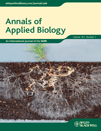
ANNALS OF APPLIED BIOLOGY
Cultivating knowledge for the next generation of agronomists.Annals of Applied Biology, published by Wiley, stands as a pivotal resource in the fields of Agronomy and Crop Science, boasting an impressive impact factor that reflects its significance and influence in the academic community. With a storied history dating back to 1914, this journal serves as a comprehensive platform for innovative research and applied studies in agricultural biology, specifically aimed at improving crop production and sustainable practices. Currently categorized in the Q1 quartile for Agronomy and Crop Science in 2023, it ranks an admirable 82 out of 406 in the Scopus database, placing it within the top 79th percentile of its category. Researchers, professionals, and students worldwide rely on the Annals of Applied Biology for cutting-edge insights and advancements in applied biological research, making it a vital component of the scientific discourse aimed at addressing pressing agricultural challenges. Please note that this journal does not offer open access options, thus ensuring a rigorous peer review process and the integrity of published work.
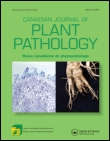
CANADIAN JOURNAL OF PLANT PATHOLOGY
Cultivating knowledge at the intersection of plant science and environmental health.Canadian Journal of Plant Pathology, published by Taylor & Francis Inc, is a leading academic journal dedicated to advancing the field of plant pathology, with a significant focus on the interplay between plant health and environmental factors. Established in 1979, this journal has established a reputation for high-quality research, currently holding a commendable impact factor within its category. As of 2023, it ranks in the Q2 quartile for both Agronomy and Crop Science as well as Plant Science, highlighting its importance and influence in these domains. With an impressive ranking of 142/516 in Plant Science and 115/406 in Agronomy and Crop Science according to Scopus, the journal is positioned within the 72nd and 71st percentiles, respectively. The Canadian Journal of Plant Pathology serves as a vital platform for researchers, professionals, and students aiming to contribute to the understanding of plant diseases, fostering innovation and development in agricultural practices.

Australasian Plant Disease Notes
Empowering Researchers with Vital Plant Disease KnowledgeAustralasian Plant Disease Notes is a vital resource in the fields of Agronomy and Plant Science, published by SPRINGER. Established to address the increasing need for research dissemination on plant diseases in the Australasian region, the journal focuses on the sharing of innovative findings and methodologies pertinent to plant health and pathology. With an ISSN of 1833-928X and E-ISSN 1833-928X, this journal serves as an open platform for researchers to contribute original research, case studies, and reviews that enhance our understanding of plant diseases. Recognized in the academic community, it achieved a Q3 ranking in both Agronomy and Plant Science categories as of 2023, indicating its relevance and significance in the field. The journal aims to support researchers, professionals, and students by providing access to critical insights that can drive advancements in agricultural practices and plant conservation efforts. With a convergence of knowledge spanning from 2009 to 2024, Australasian Plant Disease Notes is poised to make a lasting impact in the study of plant health.